The Hill’s Morning Report – Presented by Tax March – Congress returns; infrastructure takes center stage

Presented by Tax March
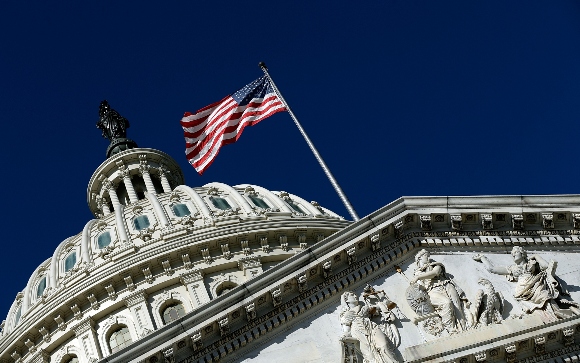
Welcome to The Hill’s Morning Report. Today is Monday! We get you up to speed on the most important developments in politics and policy, plus trends to watch. Alexis Simendinger and Al Weaver are the co-creators. Readers can find us on Twitter @asimendinger and @alweaver22. Please recommend the Morning Report to friends and let us know what you think. CLICK HERE to subscribe!
Total U.S. coronavirus deaths reported as of this morning: 562,066.
As of this morning, 35.9 percent of the U.S. population has received at least one dose of a COVID-19 vaccine and 21.9 percent is fully vaccinated, according to the Bloomberg News global vaccine tracker.
Congress returns to Washington this week with its focus trained squarely on the future of President Biden’s $2.3 trillion infrastructure and jobs blueprint as lawmakers kick off high-stakes negotiations.
The week ahead is crucial for Biden and Democrats as they explore whether bipartisan legislation is a pipedream. Biden, who signed into law a $1.9 trillion stimulus bill that passed without GOP support in March, is set to meet with top Republicans starting today as Democrats keep open the option of passing a bill via reconciliation and 51 votes in the Senate (Reuters).
“I have no doubt that we will have a great bill in the House. I hope that it will be bipartisan. I’ve been in Congress long enough to remember when bipartisanship was not unusual and that actually growing, building infrastructure has never been a partisan issue,” Speaker Nancy Pelosi (D-Calif.) told CBS’s “Face the Nation” on Sunday. “Hopefully, the need is so obvious now that Republicans will vote for it.”
The Hill: This week: Congress returns with lengthy to-do list.
The Wall Street Journal: Biden’s infrastructure plan tops priorities as Congress returns to work.
The Hill: Eight lawmakers from both parties set to meet with Biden today.
The administration’s infrastructure push dominated the Sunday talk shows. Transportation Secretary Pete Buttigieg and Energy Secretary Jennifer Granholm continued the administration’s sales pitch. Buttigieg said the White House is open to making adjustments but suggested wholesale changes are unlikely.
“I think the president will have an open mind,” Buttigieg said of planned discussions with lawmakers. “Of course, a plan gets better when you get input — from our party, from their party.”
The former South Bend, Ind., mayor dismissed a suggestion that the administration will need to return to the “drawing board” with a smaller plan that can attract sufficient votes. Biden wants to pass a measure by Memorial Day, Buttigieg added. Previously, House Democrats said their target time frame was by July 4 (The Hill).
The Sunday Shows: Infrastructure dominates.
The Hill: Buttigieg: Lawmakers can call an infrastructure package “whatever they like” but “it’s good policy.”
The Hill: Sen. John Thune (R-S.D.): “There are Republicans who would vote” for a smaller infrastructure bill.
The New York Times: Biden’s infrastructure push spurs a flurry of lobbying in Congress.
With talks heating up, competing factions within the House Democratic Caucus are going to be under even more pressure to fall in line on upcoming legislative priorities — headlined by the infrastructure bill — as they return to town facing a slimmer majority and little margin for error. The death of Rep. Alcee Hastings (D-Fla.), coupled with the swearing in of Rep.-elect Julia Letlow (R-La.), means House Democrats will be able to only have two defections and still pass legislation, assuming Republicans stick together en masse.
Letlow will officially take the seat her late husband, Luke Letlow, won in November, only to die weeks later from COVID-19.
As The Hill’s Cristina Marcos and Scott Wong note, the looming 218-212 margin in the House means that progressives — who generally have backed bills even if they don’t get everything they want — will have even less room for protest votes. Democratic leaders, mindful of protecting the centrists representing the swing districts that are essential to keeping their majority in next year’s elections, have limited ability to allow legislation to veer too far to the left.
The Washington Post: Biden seeks huge funding increases for education, health care and environmental protection in first budget request to Congress.
The Hill: White House sends mixed message on higher taxes.
The Hill: Democrats see political winner in tax fight.
Federal Reserve Chairman Jerome Powell, appearing on CBS’s “60 Minutes,” suggested the U.S. economy is poised for robust recovery and would have been “so much worse” without the coronavirus stimulus measures enacted in the last year (The Hill). Describing the economy at an “inflection point” (Reuters), the head of the central bank predicted the nation’s productivity is “about to start growing much more quickly and job creation coming in much more quickly.” The primary risk to that forecast: renewed spread of COVID-19, he added.
Powell’s appraisal, consistent with his past remarks, is viewed by some Republicans in Congress as a rationale for spending less than Biden seeks for what he calls his jobs plan.
The Hill: Pelosi on whether Rep. Matt Gaetz (R-Fla.) should resign: “That’s up to the Republicans to take responsibility for that.”
The Hill: Rep. Liz Cheney (R-Wyo.) says allegations against Gaetz, with whom she’s been an adversary at times, are “sickening.” She refused to say if she believes the congressman should resign.
CNN: Embattled Gaetz is denied a meeting with Trump.
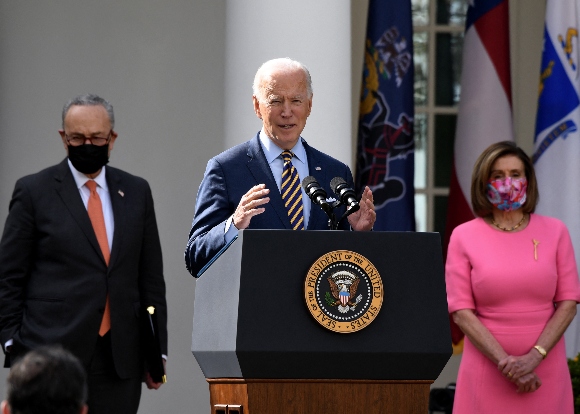
LEADING THE DAY
CORONAVIRUS: In the United States, COVID-19 headlines seem to take four steps forward for each step back. The good news this morning: An astonishing 4.6 million doses of vaccine were administered on Saturday, setting a new record. More than one fifth of the adult population is fully vaccinated. In a country with 330 million people — and with more states this week offering vaccination appointments to anyone 16 and older — the progress is encouraging.
San Jose Mercury News: Nearly half of all California adults have received a vaccine shot.
More worrisome: First, there are still rising infection rates in some states, including Michigan. Second, the United States will see an 85 percent drop this week in the allocation of doses of the one-shot Johnson & Johnson vaccine distributed by the U.S. government. Only about 785,000 Johnson & Johnson doses are expected to head to states and other jurisdictions, compared with 5 million doses last week (USA Today).
Michigan Gov. Gretchen Whitmer (D) publicly called on Biden last week to send her state more vaccine doses to combat a spike in infections, a request that was rebuffed because the administration said many states still need more doses. U.S. vaccine hesitancy means some states have thousands of unfilled appointments and excess doses on hand, a growing concern (The Hill).
ABC News: Alarming caseloads in Michigan, but Whitmer rejects new virus mandates.
CBS News: Former Food and Drug Administration Commissioner Scott Gottlieb said Sunday that in his opinion, the Biden administration should have surged vaccine doses to Michigan “weeks ago.”
Then there’s the U.S. military. Close to 40 percent of U.S. Marines have declined to receive a COVID-19 vaccine, while 61 percent of Marines have accepted shots (CNN). The Hill’s Ellen Mitchell reports the Pentagon is struggling to show how many service members have accepted coronavirus vaccines at the same time that the administration is striving to achieve something close to national herd immunity and overcome high vaccine hesitancy among some demographics (such as Republican men).
The Atlantic: Vaccine resistance results in higher health care costs for everyone.
The administration is taking steps toward an expanded role in global vaccination efforts but is feeling the heat from international aid groups, reports The Hill Nathaniel Weixel.
The Hill: A new report in the Journal of the American Medical Association finds that the two-dose Moderna vaccine leads to more reports of side effects than does the two-dose Pfizer vaccine.
The Washington Post: The effectiveness of Chinese COVID-19 vaccines is “not high” and needs improvement, according to a rare admission by the head of the Chinese Center for Disease Control and Prevention.
The Hill: South Korea officials said on Sunday they would resume administering the AstraZeneca vaccine for adults between ages 30 and 60. In Europe and the United Kingdom, rare fatal blood clots experienced as a side effect of the drug complicate the future of the “workhorse” vaccine. Regulators now appear to be considering issuing their first formal warnings about side effects. At least 94 countries of varying income levels have administered doses, and most scientists and health officials still say the benefits outweigh the risks in older people, who appear less susceptible to the clots (The New York Times). The UK nears 40 million first and second vaccine doses administered. Its economy begins to reawaken (Reuters).
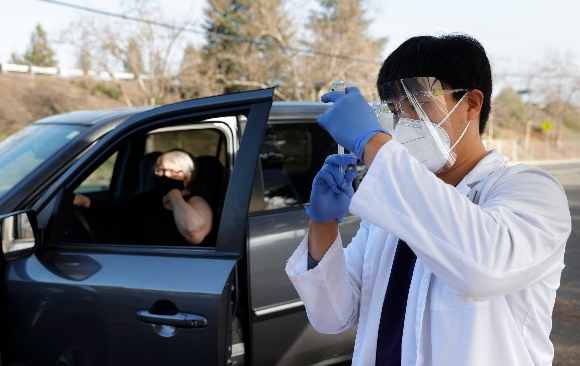
*****
POLITICS: Former President Trump escalated his feud with top Republican Party leaders on Saturday by panning Senate Minority Leader Mitch McConnell (R-Ky.) and a host of others, leaving many in the GOP unamused.
On Sunday, Republicans heaped criticism on the 45th president, who reportedly used his 50-minute, off-the-cuff remarks to top GOP fundraisers at his Mar-a-Lago resort as a forum for settling scores and going after opponents instead of promoting party unity and focusing on the looming midterm elections. McConnell earned the most pointed insult, with Trump calling him a “dumb son of a bitch.”
“Trump was predictably chaotic. … The friendly fire is going to distract McConnell from slowing down Joe Biden,” Dan Eberhart, a prominent GOP donor, told the Morning Report.
“It simply isn’t helpful,” Eberhart continued. “Trump needs to help Republicans win in 2022 to be successful in 2024, and last night was not a good start to that objective.”
Arkansas Gov. Asa Hutchinson (R), who recently was the target of Trump’s ire after he vetoed an anti-transgender bill in his home state, told CNN’s “State of the Union” that the remarks were hardly productive, adding that it wasn’t a unifying message.
“Anything that’s divisive is a concern and is not helpful for us fighting the battles in Washington and at the state level,” Hutchinson said. “In some ways, it’s not a big deal, what he said, but, at the same time, whenever it draws attention, we don’t need that. We need unity.”
Alexander Bolton, The Hill: Trump’s early endorsements reveal GOP rift.
Josh Kraushaar, National Journal: Chamber of Commerce getting squeezed on all sides.
The Hill: Former Speaker John Boehner (R-Ohio) finally calls it as he sees it.
The Hill: Democrats see opportunity in GOP feud with business.
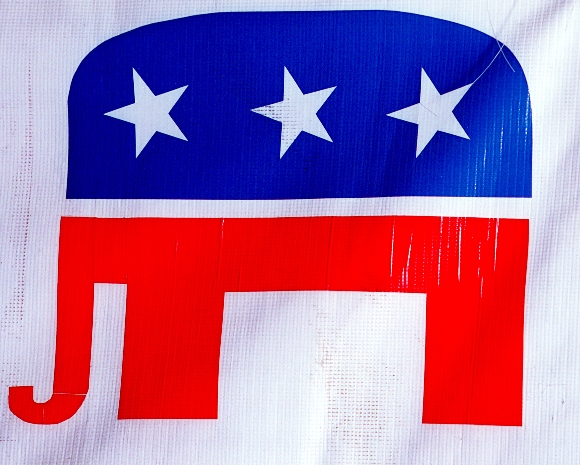
IN FOCUS/SHARP TAKES
ADMINISTRATION: National security adviser Jake Sullivan, White House national economic adviser Brian Deese and Commerce Secretary Gina Raimondo today will convene a virtual summit about shortages of semiconductors in the United States, a persistent problem that is hobbling manufacturing and jobs. They’ll be joined by top representatives from at least 19 major companies, including Ford Motor Co., General Motors, Dell Technologies, HP Inc., Samsung, Intel Corp., Northrop Grumman and Alphabet (the parent of Google) (The Washington Post).
Biden, who in February ordered a review of chip shortages, would like to see more semiconductors made in America. His executive order mandated a 100-day review of supply chains for four areas: semiconductors, large-capacity batteries used in electric vehicles, pharmaceuticals, and rare-earth elements that are key to technology and defense. He also ordered a separate, one-year review of supply chains covering six broader sectors, from technology to food production (The Wall Street Journal).
> Immigration: By June, there may be 35,000 migrant children in the care of the Biden administration, a number far beyond current U.S. capacity. One former U.S. official called the projection “terrifying.” The crisis carries broad policy and human repercussions, and the Health and Human Services Department is at the center of the Biden administration’s governance challenges (The New York Times).
> State Department: Russia’s ominous buildup of troops along the border with Ukraine will be the subject this week of discussions in Brussels involving Secretary of State Antony Blinken, who is returning to Europe (Reuters).
The Hill’s Niall Stanage analyzes some of the major foreign policy challenges the Biden administration is juggling, including China, Russia and Israel. “Unfortunately, U.S.-China relations are at perhaps their lowest point since the establishment of diplomatic relations in 1979,” Derek Grossman, a senior defense analyst at the Rand Corporation, tells The Hill.
Defense Secretary Lloyd Austin said Sunday in Tel Aviv that the U.S. commitment to Israel is “enduring an ironclad.” Austin arrived as Iran reported that its underground Natanz nuclear facility lost power just hours after starting up new advanced centrifuges capable of enriching uranium faster. If Israel caused the blackout, it would further heighten tensions between the two nations. Austin made no public mention of Iran (The Associated Press).
NBC News: There are 400 Senate-confirmable positions in the government for which Biden has not made nominations, including the heads of the Food and Drug Administration, Customs and Border Protection and the Office of Management and Budget. The president will mark 100 days in office on April 29 and advocates for good government are wringing their hands about power vacuums in cases where nominees are not in the pipeline.
The Hill: Biden and the White House are racing forward with a big agenda and a short timetable.
The Morning Report is created by journalists Alexis Simendinger and Al Weaver. We want to hear from you! Email: asimendinger@digital-stage.thehill.com and aweaver@digital-stage.thehill.com. We invite you to share The Hill’s reporting and newsletters, and encourage others to SUBSCRIBE!
OPINIONS
Court-packing isn’t the right fix for our courts. Ending life tenure is, by The Washington Post editorial board. https://wapo.st/3uFEhQx
A once-in-a-century crisis can help educate doctors, by Molly Worthen, opinion contributor, The New York Times. https://nyti.ms/3s8Yexy
A MESSAGE FROM TAX MARCH
FedEx made $1.2 BILLION in profits last year but paid NOTHING in federal income taxes. Now FedEx is trying to protect their tax breaks by lobbying against President Biden’s plan to create millions of jobs and rebuild America. Tell Congress: it’s time corporations like FedEx pay their fair share.
WHERE AND WHEN
The House meets at noon. Legislative work resumes on Tuesday at 7 p.m.
The Senate convenes at 3:30 p.m. and resumes consideration of the nomination of Polly Trottenberg to be deputy secretary of Transportation.
The president and Vice President Harris will receive the President’s Daily Brief at 10 a.m. Biden will participate in a White House summit at noon to discuss an ongoing shortage of semiconductor chips, which is currently hobbling U.S. manufacturing (Bloomberg News). The president and Harris will meet at 1:45 p.m. with lawmakers to discuss infrastructure legislation.
The White House press briefing will take place at 12:15 p.m. The administration’s COVID-19 briefing for the news media is scheduled at 11 a.m.
Hill.TV’s “Rising” program features news and interviews at http://digital-stage.thehill.com/hilltv or on YouTube at 10:30 a.m. ET at Rising on YouTube.
ELSEWHERE
➔ INTERNATIONAL: Iran on Sunday described a blackout at its underground Natanz atomic facility as an act of “nuclear terrorism,” raising regional tensions. Ali Akbar Salehi, the head of the Atomic Energy Organization of Iran, stopped short of directly blaming anyone for the incident (The Associated Press). … In Jordan, King Abdullah and former crown prince and half-brother Prince Hamza made their first joint appearance since a rift shook the country, attending a ceremony on Sunday marking 100 years of independence (Reuters). … In Great Britain on Sunday, Prince Andrew said the death on Friday of his father, Prince Philip, 99, “left a huge void” in Queen Elizabeth II’s life (BBC). The funeral for the late Duke of Edinburgh is scheduled Saturday (ABC News).
➔ COURTS: The state may rest its case as early as today in the murder trial of former Minneapolis police officer Derek Chauvin. Day 10 wrapped Friday with key testimony from the medical examiner who conducted George Floyd‘s autopsy (CBS News). … Biden’s newly created expert commission tasked with weighing potential Supreme Court changes has heightened public debate about expanding the court beyond nine justices, ending lifetime tenure for justices and whether the oldest justice among the court’s liberal wing, Stephen Breyer, 82, should resign so Biden can nominate a younger successor while Democrats still hold a narrow Senate majority (MSNBC and Politico Playbook). Biden wants any decision about how long Breyer serves on the court to be Breyer’s own, the White House said last week (The Hill).
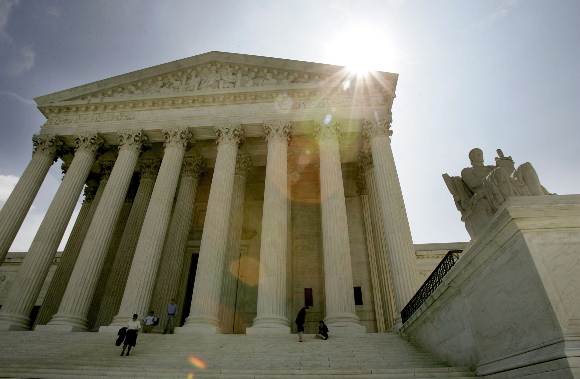
➔ STATE WATCH: What is pandemic burnout? Ask the nation’s mayors, many of whom are heading for the exits (The New York Times). … At the same time, New York City’s mayoral race is heating up ahead of the June 22 primaries (The New York Times). … In Ohio, Gov. Mike DeWine (R) cited a shortage of lethal injection drugs and lack of movement by Ohio lawmakers to switch execution methods as he delayed three remaining executions scheduled this year (Spectrum News 1). … Virginia Gov. Ralph Northam (D) on Sunday ordered an investigation by the Virginia State Police of a traffic stop in December during which two police officers held an Army second lieutenant who is Black and Latino at gunpoint in the southeast part of the state. Body-camera footage shows police pepper-spraying, striking and handcuffing Caron Nazario, 27, who is suing the officers (The Washington Post). … More than 18 state legislatures, including Arkansas, proposed or passed measures seeking to ban transgender treatments for young people. The legislative trend worries some medical experts and advocates for the LGBT community, who warn of increased suicide risks. Backers of such legislation, however, say they want to protect children from making irreversible decisions about their bodies (The Hill).
THE CLOSER
And finally … Shōsha! Hideki Matsuyama of Japan won the 85th Masters on Sunday at Augusta National to become the tournament’s first Asian-born champion and the first Japanese man to win a major golf championship.
Matsuyama, 29, shot a one-over-par 73 on Sunday to finish the tournament at 10 under par. His victory made him a national hero in golf-crazed Japan (The New York Times). He won the Asia-Pacific Amateur Championship in 2010 and 2011. He is a five-time PGA Tour winner and an eight-time Japan Golf Tour victor.

Copyright 2023 Nexstar Media Inc. All rights reserved. This material may not be published, broadcast, rewritten, or redistributed. Regular the hill posts









